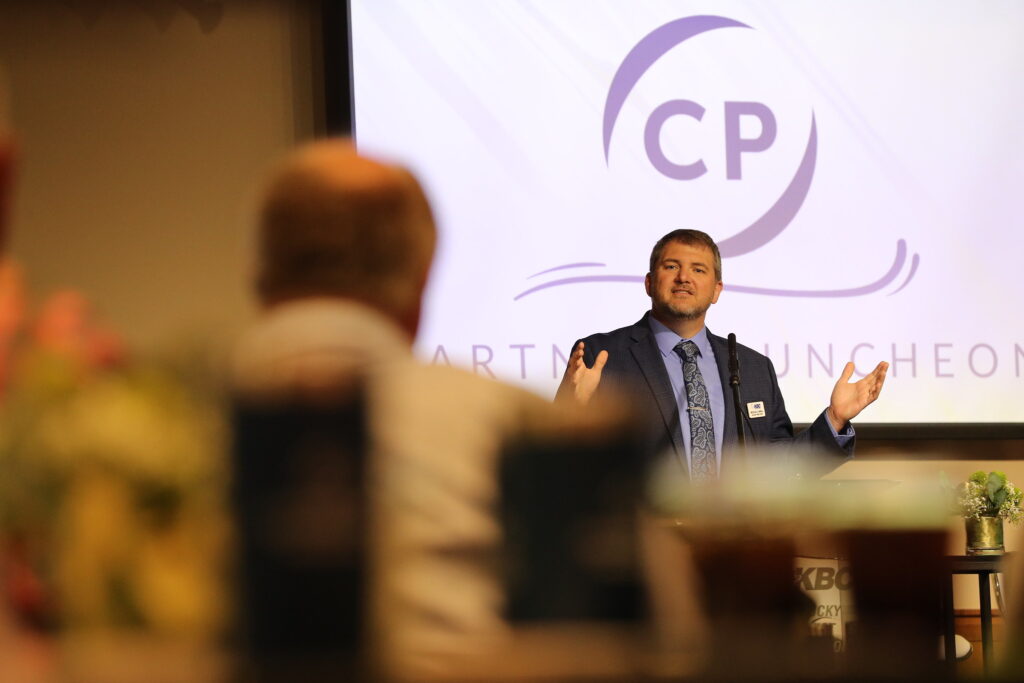
LOUISVILLE, Ky. (BP) — Michael Cabell’s position is heavily tied to helping churches reengage with the Cooperative Program. However, giving through CP isn’t the first thing he preaches to those congregations.
“Southern Baptists are a family, and there are various aspects to that,” said Cabell, assistant to the executive director for Convention Relations with the Kentucky Baptist Convention. “There are things you do together. There are ways you help each other out.
“And like a family, we’re able to accomplish more together than apart. None of us has to be isolated.”
Churches want to be effective. They want to make an impact beyond their walls, he explained.
“I want to help them see the value in being involved in our Southern Baptist family,” said Cabell, himself a pastor before joining the KBC in February 2022. “The Kingdom benefits through 728,000 Gospel conversations by the IMB last year. The church benefits because of incredible resources available to them. Pastors benefit because of seminary education at a discounted price.
“People give to things they value. And if they see the value of our Southern Baptist cooperative work, they will see the value in funding it.”
Before Cabell’s arrival, KBC Executive Director Todd Gray had already initiated a plan in May 2021 to reach approximately 600 churches that had disengaged from the Cooperative Program.
“Our goal is to have 100 percent Cooperative Program engagement with our Kentucky Baptist churches,” Gray said. “We believe it is the most effective way known to fund ministry and mission work and want every church to have an opportunity to be involved.
“Michael believes in our cooperative work at his core so when he is interacting with churches it is not just about their finances but about them being part of something much larger than themselves – an intentional strategy to impact our state, our nation and the world for Christ.”
Through extensive research and discussions with pastors, associational mission strategists and other church leaders, four prominent factors in church disengagement stood out:
- Financial struggles
- The hiring of a non-Southern Baptist pastor
- Understanding CP but not seeing the value in it
- Lack of understanding
“In many cases, churches don’t have a lot of discretionary income lying around,” Cabell said of the first category. “So, saying yes to giving through CP means saying no to something else. We don’t want them to pull out of a commitment, but we still want to serve that church and help them be a part of the Kentucky Baptist family.”
Due to a well-chronicled shortage, more churches are hiring a non-Southern Baptist pastor. As that pastor is unfamiliar with CP, it makes sense the church would soon become disengaged.
The final two categories address strategy. Most all churches give independently toward a separate ministry such as a local pregnancy resource center or funding a missionary. In addition to those, CP gives an option that is much more efficient than many may think.
“There was a research study done several years ago of thousands of missionaries,” Cabell said. “It found that 43 percent of independent missionaries will leave the field prematurely. The IMB reports that only 7 percent of their missionaries don’t fulfill their term. So, when a church gives to the Cooperative Program, their missionary is six times more likely to remain on the field.”
Last year, 67 Kentucky Baptist churches reengaged with the Cooperative Program. On average, it had been 7.5 years since the last time they had been involved, Cabell said.
“These churches have contributed $102,197 in additional CP giving since their reengagement,” he added.
In other cases, an established church may have gradually disengaged. A younger church may not be aware of the CP missions strategy. It can even happen because a new church treasurer simply wasn’t told about how to give finances through CP.
Post-reengagement reactions are positive.
“They’re surprised at the breadth of ministry being done by their Cooperative Program giving,” Cabell said. “Many are thankful that they have a missionary impact and went from supporting one or two missionaries to thousands. Reengaging with CP also typically coincides with reengaging with their state convention, which leads to them attending more events and taking advantage of resources such as our consultants. They often have no idea what the Southern Baptist Convention family can do for them and what is available to them.
“Believing that we are Better Together, we desire for every church to be an engaged partner in Gospel ministry fueled by the Cooperative Program.”
















